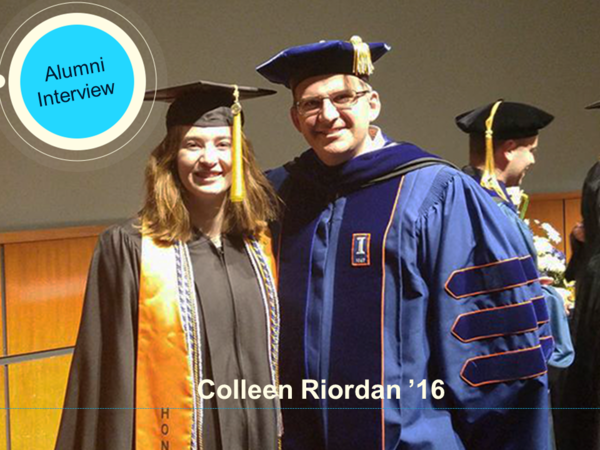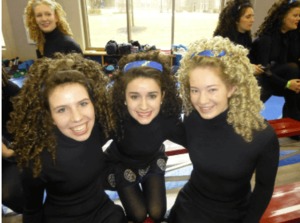
Colleen Riordan '16 says Notre Dame prepared her for a career in ways she, as an incoming student, hadn't necessarily predicted it would. The Irish Dance Team, Chemistry Club, and living in McGlinn Hall helped shape her experience here as much as her biochemistry major. Now, as a third-year Ph.D. candidate at the University of Michigan, Riordan appreciates the breadth and depth of her undergraduate years at Notre Dame.
Major: Biochemistry
Hometown: Mohegan Lake, NY
Current Position: Third-year Analytical Chemistry Ph.D. candidate, University of Michigan
How did you decide to major in biochemistry at Notre Dame?
My senior year of high school, I applied to college as a biology major, thinking that I would probably end up going into some field of medicine. I took AP Chemistry as a senior because I felt that my background in chemistry wasn’t very strong from my sophomore year chemistry class. I liked the AP Chem teacher and I had a lot of friends taking the class. I absolutely loved it. When I visited Notre Dame as an admitted student, I met a current student who was a biochemistry major. I had absolutely no idea what biochemistry really was, but I decided to enter Notre Dame as a biochemistry major because I liked both biology and chemistry and it sounded cool to do both at the same time.
So science was your thing?
I always knew that I wanted to major in science, but I also really loved history and English. I wanted a school that would allow me to have the access to a strong science program but also take core classes in a wide range of topics. I ended up loving my biochemistry major but also taking interesting classes in anthropology, psychology, literature and many other subjects. (And figure skating\curling as gym was still a requirement for me!)
What were your favorite campus activities outside of the classroom?
 Riordan (right) with Irish dance teammates
Riordan (right) with Irish dance teammates
The activity that I was the most involved with was the ND/SMC Irish Dance Team. I had been Irish dancing since I was five years old and the fact that ND had such a large, active team was an important draw for me. I was a member of the team all four years of undergraduate and joined the board as the Blue Team captain for my junior and senior year. I created and taught the choreography for our numerous shows around campus, including football game weekend events, and basketball halftime shows. I had so much fun as a member of the team; it was by far my favorite activity on campus and I was able to introduce many of my new friends to a long time passion of mine.
I was also involved in a variety of chemistry-themed activities, including being the treasurer and president of the Chemistry Club and a founding member of the chemistry mentorship program, which paired incoming first-year chemistry majors with older students for advice and support.
I lived in McGlinn Hall for all four years and absolutely loved it. There is nothing better than getting caught up in a three hour conversation in the middle of the hallway on your way to the water fountain because you know every person who lives in your hall. I still miss the sense of family the dorms provide, as well as the ability to go to Mass in my pajamas. I was a member of McG hall council for two years, serving as treasurer and gamemaker.
Tell us about your life as a Ph.D. candidate.
I’m a third-year graduate student at the University of Michigan in Ann Arbor, getting a Ph.D. in analytical chemistry. As a third-year in the Ph.D. program on a fellowship, I am researching full-time. I am working on developing microfluidic devices towards the individualized treatment of cancer. I have been collaborating with the medical school to take cancer cells, isolate active proteins, and treat these isolated proteins with a potential drug target. The goal is to find a way to test potential drugs on cancerous cells removed from the patient to know if a drug will be successful without treating the patient directly.
I have an undergraduate student now working under me. She is a senior who joined the lab the summer before her senior year. Since I found my undergraduate research experience essential in finding my next steps, I jumped on the opportunity to continue spreading my interest in chemistry research to undergraduates. I am also training a first-year graduate student on my project in the hopes that she will join the lab I am in to continue to grow my project in new and interesting directions.
How do you feel your Notre Dame education prepared you for career success?
I think Notre Dame was a vital part of my success in graduate school. Not only did I excel in my graduate level classes in chemistry, pharmacology and cancer biology, receiving all A and A+ final grades, the skills I obtained through Notre Dame’s core classes have proven to be essential. The writing and public speaking skills that Notre Dame stressed, both within the core classes and within my major, have been important to my success in graduate school. I received an award for best student oral research presentation last summer, which I attribute to the skills Notre Dame instilled in all of the students. All biochemistry majors took multiple small seminar classes in which we gave practice research talks and received useful feedback from professors and fellow students. This type of class taught essential skills that I find more useful today than the hours I spent studying for organic chemistry.
You also received the National Science Foundation Graduate Research Fellowship. Tell us about that.
My first year of graduate school, I received the [NSFGR fellowship], which covers my graduate education and stipend for three years. The strong research background, including a first-author paper, I obtained at Notre Dame was vital to my receiving this award. I joined a research lab in the Chemistry Department, working with Professor Zachary Schultz (pictured with me above), my sophomore year, where I did research for between 1-3 credits (5-15 hours a week) for the remainder of college. I spent 10 weeks on campus over the next two summers continuing this research, which was an amazing experience that I would highly recommend. By the spring of my senior year, I was spending more time in my research lab than in class, which prepared me for graduate school better than anything. I had a strong connection with the graduate students in my lab, which helped me understand what graduate school would be like, and the ability to join a lab so early and remain in the same lab for nearly three years is rare at many other universities. Graduate school has not been as daunting for me because I knew what to expect and I knew I could handle it coming in.
Another essential component to receiving the NSF GRFP fellowship was my various service and outreach examples, which is a vital part of the selection process. My first summer as a Notre Dame student, I did a Summer Service Learning Program through Notre Dame where I taught math and leadership skills to middle-school-aged children in Camden, New Jersey. The strong commitment to service that Notre Dame fosters helped me earn the fellowship and helped show me that it is possible to make time for service that you enjoy, which I continue to do even in graduate school.
How did you connect with Notre Dame alumni in Ann Arbor?
Since moving to Ann Arbor (for those of you who, like me, did not grow up in a college football family, it’s a pretty big deal for an ND grad) I’ve had an amazing experience working with the Notre Dame Young Alumni Club of Ann Arbor. We have been organizing events for the many recent graduates in graduate school, volunteering or working in this area including Trivia Nights (where we have been dominating), ND sporting events, and volunteer projects. I’ve been so happy to see that the Notre Dame community continues off campus, no matter where you end up after graduation. Moving to a brand new place and only knowing the people you work with or are in school with can be difficult, so having this group of people to experience Ann Arbor with has been amazing.
Do you have any advice for future Notre Dame students?
I think it’s important to keep an open mind with regards to your major. Take a class just because it might be interesting, because it might challenge you, or even just because you know someone who loved the professor. You never know where that might take you. If I hadn’t taken AP Chemistry my senior year in high school, I have no idea where I would be now. I have a friend who changed her major as a junior and still graduated on time, so don’t be afraid to search around for what interests you the most. Listen to people’s advice, but be willing to write your own path, don’t just choose a major because it has a clear career path forward. I didn’t know anything about Ph.D.s before college, I’m not even sure I’d ever met someone with a Ph.D. There are so many career paths out there that you’ve never even heard of, regardless of your major.
If you have a chance, join a research lab or work on a research project with a professor—this isn’t just for science majors. It’s a great opportunity to [connect with] a professor and to graduate students. Plus, you can apply for funding to stay on campus over the summer, which was an amazing opportunity [that I took advantage of]. Even if you aren’t currently thinking of graduate school, there is nothing as thrilling as being the first person to do something, learn something, find something new. Notre Dame has a huge percentage of undergraduate researchers, so take advantage of this amazing opportunity. And again, you never know where each experience will take you.